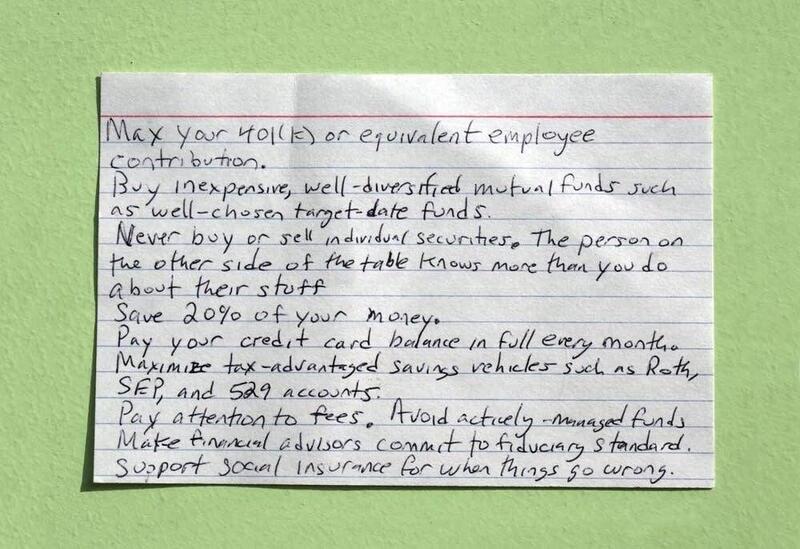
The basics of money and money management seem undeniable: spend less than you earn, avoid debt, save, and invest in a diversified, low cost portfolio.
How we behave with our money can be the difference between a successful, happy and stress-free life and an unsuccessful, unhappy and stressed one. Whether we like it or not, money matters.
Unfortunately personal finance can be a real struggle for many people and too many people let so-called “experts” manage their money, instead of spending a bit of time to first learn and make their own informed money decisions; and second to develop reliable instincts and habits for long-term financial success.
In my opinion, everyone should learn about money and understand how to budget, save and invest. The basics are not that complicated really. It’s consistent actions that are harder, and without consistent actions, you miss out on what Einstein allegedly called the most powerful force in the universe: compound interest.
In this three-part series on personal finance tracking, we will be looking at the basics of good financial behavior, how to track your finances, and how to come up with goals for saving and investing.
I’m no financial expert nor genius on money, but I have managed to create a life I love; a life where I save much more than I spend and invest it in ways that create returns. Good financial “ hygiene” and some tried-and-true investment strategies have enabled me to spend my time and money on the activities and things I truly enjoy without stressing out about money all the time too.
In this first part, I’ll share a few of the things I’ve learned about personal finance and money management. I call these “first principles,” and I think having simple go-to rules is a key part of being money smart. These are mine, and some of yours might be the same or the they might vary.
The Essence of Personal Finance on an Index Card
A couple years ago a came across this simple idea online from an economist on personal finance. He claimed that he could fit the best financial tips on an index card:

While several of these points are specific to the United States and Americans, they also carry good general principles that most anyone should follow when it comes to money money management.
Removing the non-essential, I might summarize his points this way:
- Don’t keep debt and pay your credit card debt every month.
- Save 20% of your money.
- Avoid fees (especially with banks and investments).
- Avoid taxes and invest in ways that lower or delay your tax contributions.
- Don’t buy individual stocks.
- Buy inexpensive, well-diversied mutual and index funds.
- Promote and live in place with good social welfare programs.
If you follow these essential ideas on personal finance, then your financial life should be in the first direction.
(NOTE: A full survey of financial planning and personal money management goes beyond the focus of this post. For anyone interested in personal finance, there are a lot of great books on the topic. I recommend these four books to get you started: Rich Day, Poor Dad, Think and Grow Rich, I Will Teach You To Be Rich, and Money: Master the Game.)
First Principles on Money and Personal Finance
Principles are ways of successfully dealing with reality to get what you want out of life. — Ray Dalio
In the spirit of these “index card” personal finance tips, let’s focus on some first principles or rules to live by. Instead of laying out a full discourse on financial planning, I’d like to share my principles and a short explanation of each point:
Be Aware of Your Money: You need to know where your money is. This includes debt, spending, upcoming bills, savings and investments. As we will go into in a later section, it’s easier than ever with online banking and various apps to track your money and to create a budget. The first step in any good financial life should be knowing where your money is.
Don’t Spend More Than You Make: While we almost all aspire on some level to a lifestyle of the rich and famous, very few get there, and even those that do get rich may not stay there. So, in order to be financially wise in whatever financial situation you are in, you can’t spend more than the money you have.
Reduce and Eliminate Your Debt: If you have debt, then you should first work towards eliminating your financial obligations. Before you can start saving and investing effectively, you shouldn’t have any interest payments. I’m fortunate to have finished university with no debt, but if you weren’t so fortunate, start with your college loans.
Pay Off Your Credit Card Balance in Full Every Month: Credit cards interest rates are one of the worst personal finance mistakes. So, if you are going to use credit, you must pay it off. Each and every month. Personally, I’m a big fan of cash back and travel rewards credit cards. I use credit cards often and receive rewards back. But if you can’t control your credit spending, then consider eliminating credit cards entirely.
Save a Bit More Than You Are Comfortable With (Target 20% or More): You should live reasonably and have money leftover each month and year. You should strive to save as much as possible. The goal is to have enough savings so you don’t have to work (even if you continue to). If you you need a specific number, save 20% of what you earn.
Invest: Investing shouldn’t be something for the elite and rich. Everyone should know how and invest. Investing is the process where you “give” your money to a company or person and receive because a bit of ownership and percentage of returns. Banks used to be a reasonable way to save money, but due to low rate or return, leaving your money in the bank won’t even match inflation and your money will lose value. So you need to invest in the stock market and other vehicles. Invest so your money isn’t idle and so it grows.
Invest in a Diverse Number of Low-Cost Investment Vehicles: There are a lot of different investment approaches out there. Each have varying degrees of risk and potential reward. No investment is 100% guaranteed. But these days one the best bets are low cost, low fee mutual and index funds. For example, Vanguard ETFs.
Watch Out for Fees and Subscriptions: Banks, financial planners and investments can all carry hidden fees and charges. You need to avoid and eliminate these. When it comes to banks, only use cards with little or no fees. When it comes to investments, don’t use actively managed funds which carry lots of fees. When it comes to your subscriptions, take the time to understand what you have and see if you can reduce your fixed costs.
Educate Yourself about Money, Finances and Investing: Financial literacy is a key life skill, so if you never learned about it before, take the time to learn it now. Blog posts and podcasts are a good start, but I recommend reading a few books. Besides the intro books on personal finance I mentioned at the start of this section, read a few books on investment like “Intelligent Investor,” “A Random Walk Down Wall Street” or “The Essays of Warren Buffet.”
Build Habits and Setup Systems to Automate Your Money Management and Investing: Initially personal finance takes some time and effort. You need to learn about a lot of things, but the end result should be good rules of thumb to follow and habits to live by. I use an investment tool that deducts a percentage from my primary bank account every two weeks and then invests it in various index funds. For the majority of your money, you shouldn’t be thinking about; you should have established procedures that automate your money money and investing.
Schedule Periodic Financial Check-ins: I have my financial principle, my finances and investing are automated, and I don’t read much on personal finance or investing anymore. I wouldn’t say I have mastered the money game, but I am comfortable with my approach and trust in the systems I have in place. In spite of that, it’s still important to periodically check on your finances. For me this translates to reviewing and categorizing my transactions nearly every month and to checking on my investments two or three times a year. In general though, I only do one major financial check-in before filing my taxes. During this checking I review my budget and confirm if I have excess cash to invest in stocks or personal business projects. Depending on your situation and goals, you should schedule periodic financial check-in’s too.
Set It and Forget It: Finally, while I’ve had to go through a phase of learning about finances and investing, my goal wasn’t to stay there. I didn’t want to worry about money. I wanted to focus on my life and goals. Instead of fretting about money, I’ve come up with rules to live by (see above) and automatic processes (more on this below) to track and manage my money and wealth. My bank account has an emergency fund, and I have investments where my money goes to grow. So, establish your rules and setup your systems, then forget about it.
Conclusion: What are your first principles of personal finance?
We make a living by what we get. We make a life by what we give. - Winston Churchill
One of the biggest misconceptions about money and money management is that it is complicated and beyond the ability of anyone without an CPA or MBA to handle. Finances shouldn’t be a nightmare. In fact, if you are looking at a personal finance or investment situation you don’t or can’t understand, then there is a problem. You need to reach a situation you do understand before you can and should take action.
One of the most well-known investors of all time, Warren Buffett has a famous investment checklist with rules he follows when choosing to buy a stock or not. Hi first question, “Is the business simple and understandable?” is similarly important to personal finance.
Ask yourself: Is your personal finances simple and understandable?
When it comes to your personal finances, I think you should aim to keep your finances simple and understandable too. To quote Buffett, “An investor needs to do very few things right as long as he or she avoids big mistakes.” For your personal finances the key is avoiding big mistakes just as much. Hopefully my list of principles covered the big do’s and don’t’s.
By following a few straightforward principles you can make money management an automatic habit. In turn, with good financial hygiene (i.e. spending less, saving more, etc.), you are now able to invest your money. By investing, your money grows.
Have you figured out your first principles on money? What are your financial principles? What tips did I miss?
